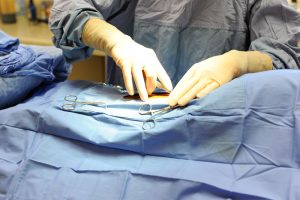Your pets’ oral health is essential to their physical wellness. A clean, healthy mouth is important and can help ensure overall health for your pet.
NO PET IS TOO OLD FOR A DENTAL!
Symptoms of a pet in need of a dental include:
Bad breath, red, inflamed, swollen gums, and/or tartar build up on the teeth.
Yearly veterinary exams including oral examination is key to identifying these problems early.
Why are dentals needed?
Tartar and plaque build-up on the teeth can cause gingivitis (inflammation of gums) and infection. This can lead to bone loss in the jaw, tooth abscesses and even systemic infection, including heart disease, kidney problems, and liver problems. Untreated dental issues are not only bad for the health of your pet but can be extremely painful.
How are dentals done?
A complete oral exam is performed, including measuring of peridontal pockets, gum recession, and status of gingival tissue. Gingival, and sub-gingival, ultrasonic scaling is performed. All teeth are polished and fluoride treatment applied. If necessary, extractions are performed with local anesthesia for added pain control by a licensed veterinarian. All dental procedures require general anesthesia and a veterinarian will examine the pet prior to being anesthetized. Our dental procedures include: daytime hospitalization, safe anesthesia methods and monitoring, full oral health exam, ultrasonic scaling, polishing of all teeth, and a fluoride treatment. Dental xrays can also be performed to reveal any existing problems under the gums that cannot be seen by examination.


 You can make a difference! Every year, millions of unwanted dogs, cats, puppies, kittens are euthanized. By sterilizing your pet you will prevent unwanted births and enhance your pet’s quality of life. The surgery eliminates behavioral problems associated with mating instinct. These undesirable behaviors may include: female aggression in dogs due to cycle, urination and yowling in cats due to heat cycle, marking behavior in male dogs and cats, roaming and aggression based on mating behavior. In addition to eliminating undesirable mating behavior, spaying and castration also helps to prevent some serious health concerns such as: prostate disease, ovarian and testicular cancer, pyometra (a life threatening uterine infection due to hormonal influences), and can reduce the odds of your dog developing breast cancer by as much as 90%! Consult with one of our veterinarians about the most appropriate time to spay or neuter your pet.
You can make a difference! Every year, millions of unwanted dogs, cats, puppies, kittens are euthanized. By sterilizing your pet you will prevent unwanted births and enhance your pet’s quality of life. The surgery eliminates behavioral problems associated with mating instinct. These undesirable behaviors may include: female aggression in dogs due to cycle, urination and yowling in cats due to heat cycle, marking behavior in male dogs and cats, roaming and aggression based on mating behavior. In addition to eliminating undesirable mating behavior, spaying and castration also helps to prevent some serious health concerns such as: prostate disease, ovarian and testicular cancer, pyometra (a life threatening uterine infection due to hormonal influences), and can reduce the odds of your dog developing breast cancer by as much as 90%! Consult with one of our veterinarians about the most appropriate time to spay or neuter your pet.